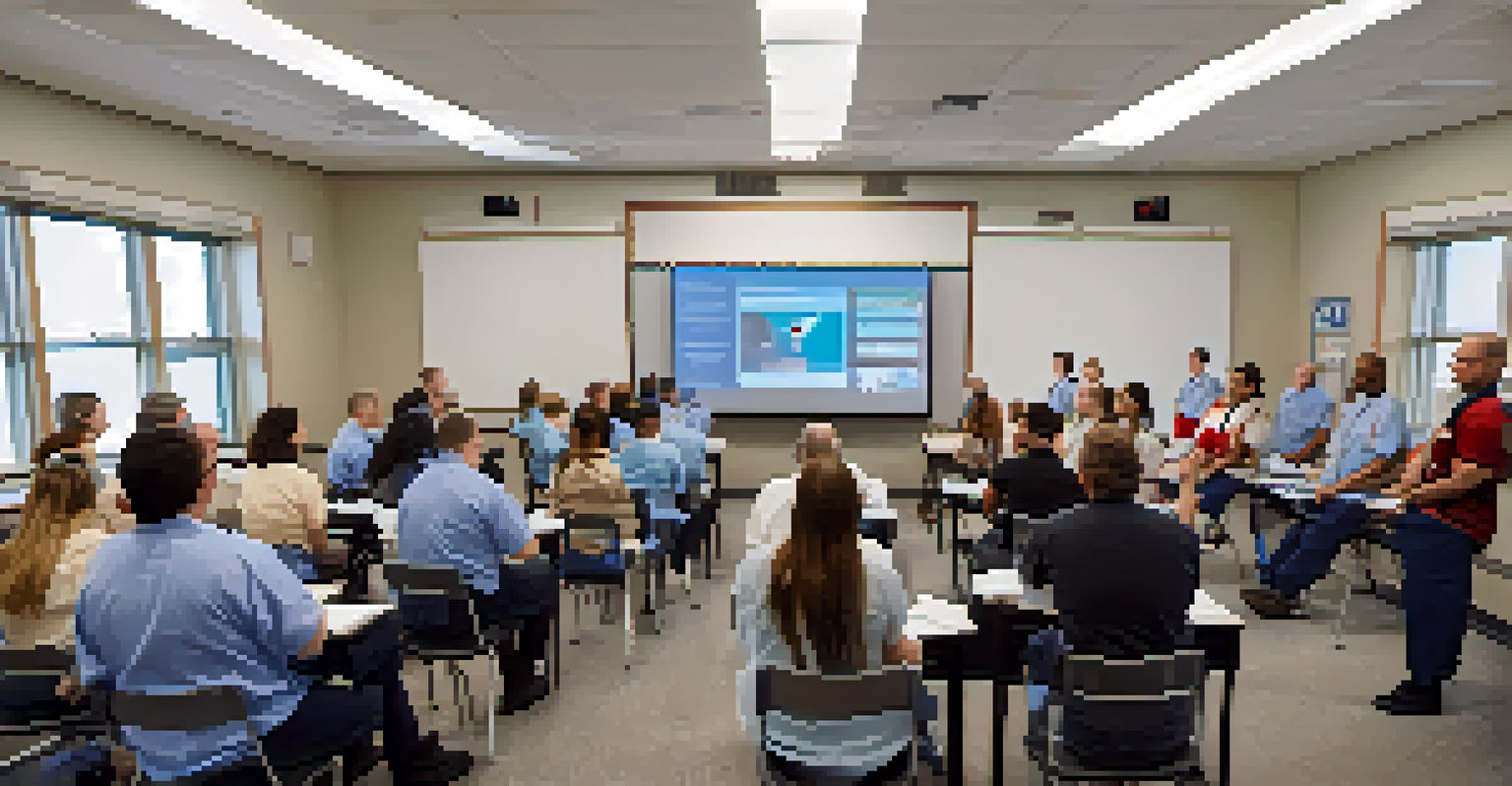How Emergency Medicine Impacts Public Health Initiatives

Understanding Emergency Medicine and Its Scope
Emergency medicine is a specialized field of medical practice focused on providing immediate treatment for acute illnesses and injuries. This branch of medicine plays a crucial role in ensuring that patients receive rapid care, which can be life-saving. It encompasses various settings, including emergency departments, urgent care facilities, and pre-hospital environments, where quick decision-making is essential.
Emergency medicine is not just about treating injuries and illnesses; it’s about understanding the bigger picture of public health.
One of the key aspects of emergency medicine is its interdisciplinary nature, involving collaboration among healthcare professionals, first responders, and public health officials. This teamwork is vital during emergencies, as it lays the groundwork for effective patient care and health outcomes. By understanding the scope of emergency medicine, we can appreciate its influence on broader public health initiatives.
Moreover, emergency medicine is not just reactive; it also contributes to preventive measures. By analyzing trends in emergency cases, healthcare providers can identify potential public health threats and work towards mitigating them, showcasing the field's proactive role in safeguarding community health.
The Intersection of Emergency Medicine and Public Health
Emergency medicine and public health are intertwined, with each field influencing the other in significant ways. Emergency departments often serve as the first line of defense in identifying and responding to public health crises, such as infectious disease outbreaks or natural disasters. The data collected during these emergencies can inform public health strategies and policies, ultimately improving community health outcomes.

For instance, during the COVID-19 pandemic, emergency medicine teams played a pivotal role in treating patients and gathering vital information on the virus's spread. This data not only helped in immediate patient care but also aided public health officials in making informed decisions about lockdowns, resource allocation, and vaccination strategies.
Emergency Medicine's Vital Role
Emergency medicine provides immediate care for acute illnesses and injuries, significantly impacting patient survival rates.
Additionally, emergency medicine practitioners frequently engage in public health education, raising awareness about prevention and safety. By promoting health literacy within communities, they help empower individuals to make informed choices, which can reduce the need for emergency care in the long run.
Emergency Preparedness and Response Planning
Emergency preparedness is a fundamental component of public health, and it relies heavily on the expertise of emergency medicine. This planning involves developing protocols and training for healthcare providers and first responders to effectively manage crises. Comprehensive response plans ensure that communities can quickly mobilize resources and personnel during emergencies, minimizing potential harm.
Data is the lifeblood of emergency medicine and public health; it drives decisions, improves outcomes, and saves lives.
For example, drills and simulations conducted by emergency medicine teams prepare healthcare systems for various scenarios, from mass casualty incidents to bioterrorism threats. These exercises not only enhance individual and collective response capabilities but also foster collaboration among different sectors, including government agencies and non-profit organizations.
Moreover, the lessons learned from past emergencies can lead to improved public health policies. By analyzing the successes and challenges faced during these events, emergency medicine professionals can help shape future strategies, ensuring communities are better prepared for whatever challenges may arise.
Data Collection and Surveillance in Emergency Medicine
Data collection is a cornerstone of both emergency medicine and public health initiatives. Emergency departments are often at the forefront of data gathering during health crises, providing critical information about patient demographics, symptoms, and outcomes. This data not only aids in immediate patient care but also informs public health surveillance systems.
For example, during an outbreak of a contagious disease, emergency medicine professionals can quickly report trends and patterns, helping public health officials track the spread and implement control measures. The timely sharing of this information can significantly reduce the impact of an outbreak on the community.
Data Drives Public Health Strategies
Data collection during emergencies informs public health responses and helps track disease outbreaks effectively.
Furthermore, the integration of technology, such as electronic health records and real-time reporting systems, enhances the efficiency of data collection. By streamlining these processes, emergency medicine can contribute to more robust public health monitoring and response efforts.
Community Engagement and Health Education Initiatives
Community engagement is vital for the success of public health initiatives, and emergency medicine plays a key role in fostering this connection. Emergency departments often serve as vital community resources, providing education on injury prevention, health screenings, and access to care. By actively engaging with the community, emergency medicine teams can help address local health needs and promote healthier behaviors.
For example, outreach programs led by emergency medicine professionals may focus on issues such as substance abuse prevention, mental health awareness, or chronic disease management. These initiatives not only empower individuals with knowledge but also strengthen community resilience against health crises.
Additionally, partnerships between emergency medicine and local organizations can amplify public health messages. Collaborative efforts, such as health fairs or workshops, can raise awareness and encourage proactive health measures, ultimately leading to a healthier community.
The Role of Research in Emergency Medicine and Public Health
Research is essential to advancing both emergency medicine and public health initiatives. Through clinical studies and evaluations, emergency medicine practitioners can identify best practices, improve treatment protocols, and contribute to evidence-based public health policies. This continuous cycle of research and application ensures that healthcare systems evolve and adapt to emerging health challenges.
For instance, research conducted in emergency departments can lead to innovative approaches in handling specific conditions, such as trauma or cardiac arrest. These findings can then inform broader public health strategies, enhancing overall health outcomes for communities.
Community Engagement is Key
Active community engagement by emergency medicine professionals enhances health education and promotes preventive measures.
Moreover, collaboration between emergency medicine researchers and public health experts fosters a multidisciplinary approach to health issues. By combining their expertise, these professionals can tackle complex challenges more effectively, ultimately benefiting public health as a whole.
Challenges and Opportunities in Emergency Medicine
While emergency medicine significantly impacts public health initiatives, it also faces challenges that need addressing. High patient volumes, limited resources, and the increasing complexity of cases can strain emergency departments, potentially compromising care quality. Recognizing these challenges is essential for developing effective solutions that enhance both emergency care and public health.
However, these challenges also present opportunities for innovation and improvement. For instance, integrating telemedicine into emergency care can help alleviate some burdens by allowing healthcare providers to triage patients remotely. This not only improves access to care but also enhances the overall efficiency of emergency services.

Furthermore, advocating for policies that support emergency medicine funding and resources can strengthen public health systems. By addressing these challenges head-on, emergency medicine can continue to play a vital role in shaping effective public health initiatives.